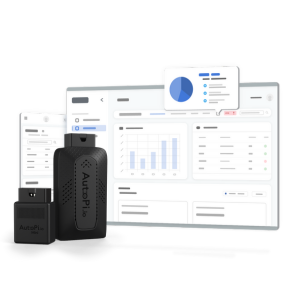In the world of fleet management, selecting the right vehicles is crucial for business efficiency and success. Fleet vehicles, essential for operational support, require careful consideration, especially when considering the options between new and used models.
Making informed decisions in this area is key to optimizing both performance and cost-effectiveness. Understanding the details of managing a fleet, particularly the nuances of incorporating used vehicles, is vital for any business looking to enhance its operational fleet.
What is a Fleet Vehicle?
A fleet vehicle refers to any car, truck, van, or other mode of transportation that is owned or leased by a business, government agency, or other organization rather than an individual.
These vehicles are typically used for carrying out the operations and services of the organization. The scope of fleet vehicles can vary widely, ranging from small cars used for light-duty tasks to large commercial trucks for heavy transport.
Fleet vehicles are distinct in that they are often purchased in bulk and may have uniform branding, such as company logos or colors, to represent the organization. They are also subject to different management practices compared to personal vehicles. This includes regular maintenance schedules, tracking systems for logistics and efficiency, and sometimes, restrictions on personal use by employees.
The management of these vehicles, known as fleet management, involves a range of activities including:
-
Vehicle financing,
-
health and safety management, and many more.
The objective of fleet management is to ensure the efficient operation of the fleet, minimize costs, and comply with government regulations.
Organizations prefer fleet vehicles for various reasons, such as ensuring consistent quality and reliability of transportation, taking advantage of bulk purchasing discounts, and maintaining a controlled image in the public eye. Fleet vehicles are a critical asset in many industries, providing essential services that keep businesses and public services operational.

The Meaning of Fleet Vehicle in Simple Words
A fleet vehicle is more than just collection of cars owned by a business. It's about meeting specific transportation needs efficiently. Whether it's a rental car company, a government agency, or any business, fleet vehicles are usually bought in bulk - often more than 10 at a time. This bulk buying can be as simple as leasing or purchasing a few vehicles, but it often involves larger numbers.

These vehicles are used for various reasons, like making deliveries, providing transportation for employees or clients, or serving as company cars. After being used for business, many of these vehicles are sold in the used-car market.
Buying fleet vehicles can be cost-effective for businesses. By purchasing or leasing in bulk, companies often get discounts from manufacturers. This makes managing a fleet of vehicles a smart financial move for many businesses, as it helps to meet their specific transport needs while also being mindful of the budget.
Pros and Cons of Buying Fleet Vehicles
When considering buying fleet vehicles, it's important to weigh both the advantages and disadvantages to make the best decision for your business. Here are some key pros and cons to consider:
Pros:
-
Cost Savings: Bulk purchases often come with significant discounts, reducing the overall cost per vehicle.
-
Uniformity: Having a fleet of similar vehicles ensures consistency in appearance and performance.
-
Customization: Fleet vehicles can be customized to meet specific business needs, such as branding or special equipment.
-
Tax Benefits: Businesses can often take advantage of tax deductions for fleet vehicle expenses.
-
Resale Value: Well-maintained fleet vehicles can retain good resale value.
Cons:
-
Depreciation: Fleet vehicles can depreciate quickly, especially if heavily used.
-
Maintenance Costs: Managing a fleet means regular maintenance in appliance to the DVIR, which can be costly.
-
Insurance Premiums: Insuring multiple vehicles can lead to higher insurance costs.
-
Less Flexibility: Being tied to a fleet can limit flexibility if business needs change.
-
Management Resources: Fleet management requires dedicated time and resources for efficient operation.
Each of these factors plays a crucial role in determining whether acquiring fleet vehicles aligns with your business goals and operational requirements. While purchasing or leasing directly from manufacturers can be beneficial, considering a reliable used car dealership can often lead to finding high-quality fleet vehicles at competitive prices. Additionally, securing flexible car insurance options can make managing fleet vehicles even more convenient and cost-effective. This pathway provides an alternative that blends cost-effectiveness with the assurance of dependable performance.
Should I Buy a Fleet Vehicle?
Deciding whether to buy a fleet vehicle, particularly a used one, is a significant decision that hinges on various factors specific to your business or personal needs. Here are some considerations to help you determine if purchasing a used fleet vehicle is the right choice for you:

-
Assess Your Needs: Consider the primary purpose of the vehicle. If it's for regular, heavy-duty business use, a fleet vehicle might offer the durability and functionality you need.
-
Budget Constraints: Used fleet vehicles can be more affordable than new ones. If you're working with a limited budget, buying used could be a cost-effective solution.
-
Vehicle History: Investigate the maintenance and usage history of the used fleet vehicle. A well-maintained vehicle with a transparent history can be a good investment.
-
Long-Term Use: Consider how long you plan to use the vehicle. Used fleet vehicles might have a shorter lifespan compared to new ones, depending on their past use and maintenance.
-
Resale Value: Think about the potential resale value. Some fleet vehicles, especially those well-maintained and in high demand, can retain good resale value.
-
Warranty and Support: Check if the used fleet vehicle comes with any warranty or support from the seller. This can be crucial for managing maintenance costs.
How to Buy a Fleet Vehicle
Buying a fleet vehicle, especially for business purposes, involves a detailed and strategic process. Here are the steps to guide you through this crucial decision:
-
Identify Business Requirements:
-
Assess the type and volume of cargo to be transported, and the distances involved.
-
Consider your budget and project timeline.
-
Determine the physical specifications needed for the vehicle, such as size, capacity, and fuel efficiency.
-
-
Credit and Budget Analysis:
-
Check your credit score to understand your financing options and potential loan rates.
-
Create a detailed budget, including your desired monthly payment, down payment, and trade-in values.
-
Use a car affordability calculator to estimate your interest rate and potential loan terms.
-
-
Loan Preapproval:
-
Apply for preapproval with multiple lenders to compare rates and terms.
-
Preapproval gives you a clearer idea of what you can afford and enhances your negotiating power.
-
-
Vehicle Selection:
-
Stick to your predetermined budget.
-
For used vehicles, consider a thorough inspection by a trusted mechanic and research the vehicle’s history report.
-
Choose a vehicle that meets both your business and budgetary needs.
-
-
Closing the Deal:
-
Finalize your loan with a hard credit pull, which may slightly impact your credit score.
-
Review and sign the loan contract to complete the purchase.
-
-
Fleet Management Systems Investment:
-
Consider investing in a fleet management system or vehicle telematics to optimize operations.
-
These systems can help manage maintenance, fuel consumption, and enhance overall efficiency.
-
-
Customization:
-
If necessary, customize the fleet vehicles to meet specific operational needs, such as installing special equipment or branding.
-
Each of these steps is vital in ensuring that your fleet vehicle purchase aligns with your business goals and operational efficiency. Properly selected and managed fleet vehicles can directly contribute to the productivity and profitability of your business.






